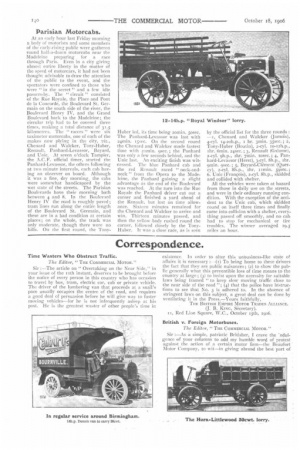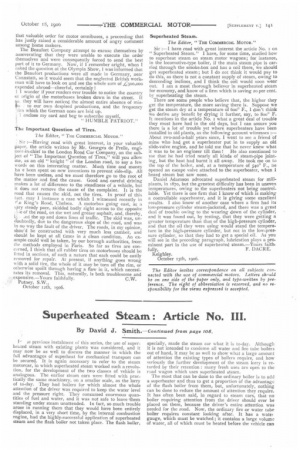Correspondence.
Page 28

Page 29

If you've noticed an error in this article please click here to report it so we can fix it.
Time Wasters Who Obstruct Traffic.
The Editor," THE COMMERCIAL MOTOR."
Sir :--The article on " Overtaking on the Near Side," in your issue of the //th instant, deserves to be brought before the notice of every person in this country who has occasion to travel by bus, tram, electric car, cab or private vehicle. The driver of the lumbering van that proceeds at a snail's pace usually occupies the centre of the road, and requires a good deal of persuasion before he will give way to faster moving vehicles—for he is not infrequently asleep at his post. lIe is the greatest waster of other people's time in
existence. In order to alter this unnusiness-like state of affairs it is necessary : -(f) To bring home to these drivers the fact that they are public nuisances; (2) to show the public generally what this preventible loss of time means to the country at large; (3) to insist upon the necessity for suitable laws being framed " to keep slow moving ,traffic close to the near side of the road "; (4) that the police have iristruetions to see that No. 3 is adhered to. In the absence of stringent laws on this subject, a great deal can be done by ventilating it in the Press.—Yours faithfully, THE BRITISH EMPIRE MOTOR TRADES ALLIANCE. (J. B. RING, Secretary).
11, Red Lion Square, W.C., October /5th, 1906.
British v. Foreign Motorbuses.
The Editor," TUE COMMERCIAL MOTOR."
Sir :—As a simple, patriotic Britisher, I crave the 'ndulgence of your columnsto add my humble word of protest against the action of a certain motor firm—the. Beaufort Motor Company, to wit—in giving abroad the best part of
that valuable order for motor omnibuses, a proceeding that has justly raised a considerable amount of angry comment among home makers.
The Beaufort Company attempt to excuse themselves by asseverating that they were unable to execute the order themselves and were consequently forced to send the best part of it to Germany. Now, if I remember aright, when I asked the question at the Olympia Show I was informed that the Beaufort productions were all made in Germany, near Cannstatt, so it would seem that the neglected British workman will have to look on and see the whole sum of L;300,000 expended abroad—cheerful, certainly I
I I wonder if your readers ever trouble to notice the country 01 origin of the motorbuses broken down in the street. If 4o. they will have noticed the almost entire absence of mis • to our own despised productions, and the frequency :lin which the German ones are laid up. t enclose my card and beg to subscribe myself, "HUMBLE PATRIOT."
The Important Question of Tires.
7 he Editor, "THE COMMERCIAL MOTOR."
Sr :—Having read with great interest, in your valuable paper, the article written by Mr. Georges de Prelle, engineer-in-chief to the London Road Car Company, on the subject of "The Important Question of Tires," will you allow me, as an old " knight " of the London road, to say a few words on this interesting matter. Much time and money ha e been spent on new inventions to prevent side-slip. All have been useless, and we must therefore go to the root of the matter and find the cause. Good and careful driving makes a lot of difference to the steadiness of a vehicle, but it does not remove the cause of the complaint. It is the road that causes the skid, not the tires. In proof of this tact. may 1 instance a case which I witnessed recently in .".e King's Road, Chelsea. A motorbus going east, at a %.ery steady pace, skidded badly right across to the opposite • .e of the road, on the wet and greasy asphalt, and, thereby,
L .ed the up and down lines of traffic. The skid was, undoubtedly, due to the dangerous slope of the road, and was in no way the fault of the driver. The roads, in my opinion, shou'd be constructed with very much less camber, and should be kept at all times in a clean condition. An example could well be taken, by our borough authorities, from the methods employed in Paris. So far as tires are concerned, I think that all rubber tires on motorbuses should be fitted in sections, of such a nature that each could be easily retnoved for repair. At present, if anything goes wrong with a solid tire, the whole of it may be torn off the rim, or otherwise spoilt through having a flaw in it, which necessitates its removal. This, naturally, is both troublesome and
expensive.—Yours faithfully. C.W. Putney, S.W., October nth, Too6. Superheated Steam.
The Editor, " THE COMMERCIAL MOTOR."
Sir :—I have read with great interest the article No. z on "Superheated Steam." I have, for some time, studied how to superheat steam on steam motor wagons; for instance, in the locomotive-type boiler, if the main steam pipe is carried through the smoke-box and has a coil there, we should get superheated steam; but I do not think it would pay to do this, as there is not a constant supply of steam, owing to descending inclines, and I think the coil would soon wear out. I am a most thorough believer in superheated steam for economy, and know of a firm which is saving 20 per cent. by superheating the steam. There are some people who believe that, the higher they get the temperature, the more saving there is. Suppose we get the steam dry at a temperature of 600° F., I don't think we derive any benefit by drying it further, say, to 800° F. It mentions in the article No. z what a great deal of trouble they must have had in the old days, but I can assure you there is a lot of trouble yet where superheaters have been installed in old plants, as the following account witnesses :— About two-and-a-half years since, I went to see a friend of mine who had got a superheater put in to supply an old slide-valve engine, and he told me that he never knew what it was to be an engineer till then! He also mentioned to me that he had tried nearly all kinds of steam-pipe jointing, but the heat had burnt it all away. He took me on to the top of the boiler, and, at a temperature of 540° F., lie opened an escape valve attached to the superheater, when I heard steam but saw none. Daniel Adamson advocated superheated steam for millplants, in 1870, but the greatest difficulty has been in uneven temperatures, owing to the superheaters not being controllable. Yet there is one firm that I know of which is making a controllable superheater, and it is giving some excellent results. I also know of another case where a firm had its low-pressure cylinder steam-jacketed, and there was a great deal of trouble owing to the wearing down of the cylinder, and it was found out, by testing, that they were getting a greater temperature than that of the high-pressure cylinder, and that the oil they were using would stand the temperature in the high-pressure cylinder, but not in the low-pressure cylinder, so that they had to get a special oil. As you will see in the preceding paragraph, lubrication plays a prominent part in the use of superheated steam.—Yours faith. fully, F. DACRE. Keighley.
October i3th, 1936.
































